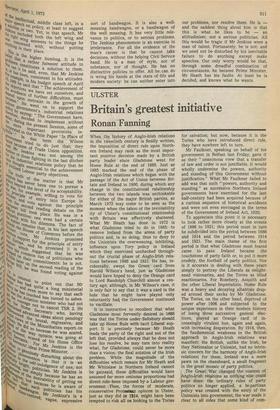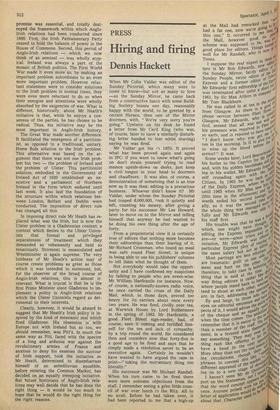ULSTER
Britain's greatest initiative
Ronan Fanning
When the history of Anglo-Irish relations in the twentieth century is finally written, the imposition of direct rule upon Northern Ireland, may rank as the most important positive decision made by a British party leader since Gladstone went for Home Rule at the end of 1885. Just as 1885 marked the end of the phase of Anglo-Irish relations which began with the passage of the Act of Union between Britain and Ireland in 1800, during which any change in the constitutional relationship between the two islands was unthinkable for either of the major British parties, so March 1972 may come to be seen as the moment when the taboo of the inviolability ity of Ulster's constitutional relationship with Britain was effectively shattered. What Mr Heath has done in 1972 is what Gladstone tried to do in 1885: to remove Ireland from the arena of party politics and, in so doing, thus to deny to the Unionists the overweening, inhibiting, influence upon Tory policy in Ireland which they exercised unchecked throughout the crucial phase of Anglo-Irish relations between 1886 and 1921. He has, incidentally, swept the Green card from Harold Wilson's hand, just as Gladstone would have hoped to deny the Orange card to Lord Randolph Churchill almost a century ago; although, in Mr Wilson's case, it is only fair to say that it was a card in the hale that he might have played only reluctantly had the Government continued to vacillate.
It is instructive to recollect that what Gladstone most fervently desired in 1885 was that the Tories under Salisbury should take up Home Rule with tacit Liberal support. It is precisely because Mr Heath leads the party of the right and not of the left that, provided always that he does not lose his resolve, he may turn into reality what, for Gladstone, could never be more than a vision: the final solution of the Irish problem. While the magnitude of the difficulties which remain for Mr Heath and Mr Whitelaw in Northern Ireland cannot be gainsaid, these difficulties would have assumed far more ominous proportions had direct rule been imposed by a Labour government. Then, the forces of moderate, conservative Protestant opinion in Ulster, just as they did in 1914, might have been tempted to risk all on looking to the Tories for salvation; but now, because it is the Tories who have introduced direct rule, they have nowhere left to turn.
Mr Faulkner, speaking on behalf of his government in Belfast last Friday, gave it as their "unanimous view that a transfer of law and order is not justifiable. It would wholly undermine the powers, authority and, standing of this Government without justification." What Mr Faulkner failed to add was that such "powers, authority and standing" as successive Northern Ireland governments have exercised for the last half-century had been acquired because of a curious sequence of historical accidents and were not even envisaged in the terms of the Government of Ireland Act, 1920.
To appreciate this point it is necessary to look rather more closely at the events of 1886 to 1921; this period must in turn be subdivided into the period between 1886 and 1914 and the period between 1914 and 1921. The main theme of the first period is that what Gladstone must feared came to pass; Ireland became the touchstone of party faith or, to put it more crudely, the football of party politics. Nor is it accurate in dealing with these years simply to portray the Liberals as enlightened visionaries, and the Tories as blind reactionaries. For Rosebery, Asquith and the other Liberal Imperialists, Home Rule was a heavy and decaying albatross draped around their necks by Mr Gladstone. The Tories, on the other hand, deprived of power after 1906 and subjected to the unique experience in their modern history of losing three successive general elections, played an Orange card of increasingly virulent hue, again and again, with increasing desperation. By 1914, then, the fundamental weakness in the British approach to Anglo-Irish relations was manifest: the British, unlike the Irish, be they Nationalist or Unionist, had no intrinsic concern for the harmony of Anglo-Irish relations; for them, Ireland was a mere pawn on the chessboard, a small fragment in the great mosaic of party politics.
The Great War changed the context of Anglo-Irish relations as nothing else could have done: the ordinary rules of party politics no longer applied, a bi-partisan policy was created with the entry of the Unionists into government; the war made it clear to all sides that some kind of corn promise was essential, and totally destroyed the framework within which AngloIrish relations had been conducted since 1886. First, the Irish Parliamentary Party ceased to hold the balance of power in the House of Commons. Second, this period of Anglo-Irish relations — which we now think of as seminal — was wholly atypical. Ireland was always a part of the mosaic of British politics. The First World War made it even more so, by making an important problem subordinate to an even more important problem. However reluctant statesmen were to consider solutions to the Irish problem in normal times, they were even more reluctant to do so when their energies and attentions were wholly absorbed by the exigencies of war. What is different, historically, about Mr Heath's initiative is that, while he enjoys a consensus of the parties, he has chosen to be radical. Thus, his initiative may be the most important in Anglo-Irish history.
The Great War made another difference. It facilitated the emergence of a partitionist, as opposed to a traditional, unitary, Home Rule solution to the Irish problem. This alternative was based on the argument that there was not one Irish problem but two — the problem of Ireland and the problem of Ulster. This partitionist solution, embodied in the Government of Ireland Act of 1920 established an executive and a parliament of Northern Ireland in the form which endured until last week. It also laid the foundation of the structure within which relations between London, Belfast and Dublin were conducted. The imposition of direct rule has changed all this.
In imposing direct rule Mr Heath has replaced what was the Irish, but is now the Ulster problem in a Gladstonian context: a context which denies to the Ulster Union ists that formal and privileged separateness of treatment which they demanded so vehemently and held so tenaciously. Stormont is emasculated and Westminster is again supreme. The very boldness of Mr Heath's action may of course create problems as great as those which it was intended to surmount, but, for the observer of the broad course of Anglo-Irish relations, this is almost irrelevant. What is crucial is that he is the first Prime Minister since Gladstone to implement a policy in Anglo-Irish relations which the Ulster Unionists regard as detrimental to their interests.
Clearly, however, it would be absurd to suggest that Mr Heath's Irish policy is inspired by the kind of messianic zeal which fired Gladstone. His obsession is with Europe not with Ireland but so too, we should remember, was Pitt's. In much the same way as Pitt, faced with the spectre of a long and arduous war against the revolutionary armies of France and anxious to deny his enemies the succour of Irish support, took the initiative so Mr Heath, determined to disembarrass himself of an antediluvian squabble, before entering the Common Market, has decided on an equally sweeping initiative. But future historians of Anglo-Irish relations may well decide that he has done the right thing — it would be too much to hope that he would do the right thing for the right reasons.



































 Previous page
Previous page